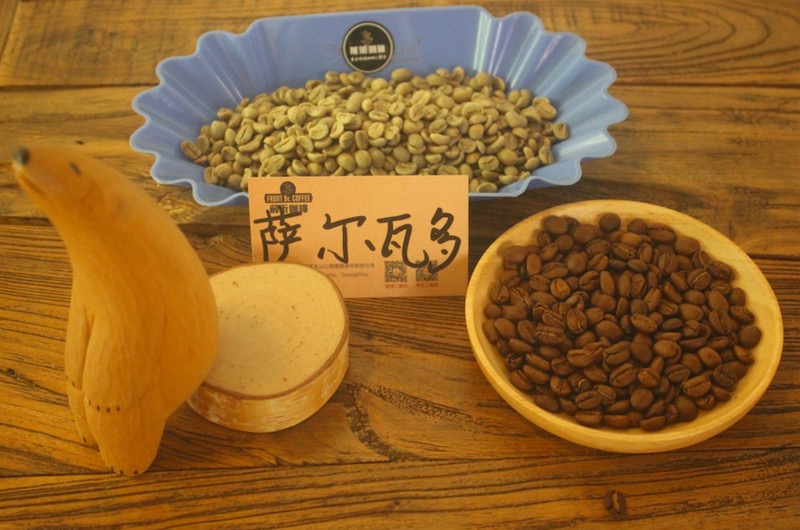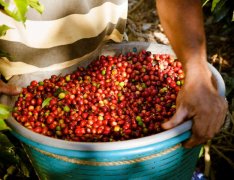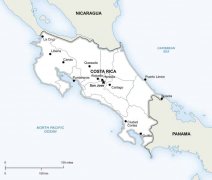El Salvador COE Competition Champion Coffee Bean Manor Podosi History Story Olive Tree Manor Introduction
The coffee industry is crucial to El Salvador's economic growth and is a catalyst for road and rail construction. Although it is no longer so important to today's economy, coffee is still one of its iconic crops. Coffee plantations account for 12 per cent of El Salvador's arable land and employ about 135000 workers.
Qianjie will come to share with you the coffee estate from El Salvador.
The first to bear the brunt is the Porto West Manor of San Ignacio Oros Bozos in the province of Charette Nango, El Salvador.

Although many other importers focus their procurement in El Salvador on larger mainly bourbon farms in Santa Ana and its surrounding areas. But in fact, the more remote parts of El Salvador also produce high-quality coffee beans, and Charat Nango Farm is a typical example.
Don Ignacio, the landowner, has a long history in agriculture: before he started growing coffee in 2000, he planted wood and tomatoes and started his farms La Roxanita and Los Pocitos with 500 coffee trees. He grows coffee on about five fertile soils in Mansana in El Salvador and produces great coffee year after year: in 2011, 2013 and 2015, his coffee won first place in CoE competitions.
He has produced a large number of family heirlooms, some of which have been washed and some treated with honey.
The Remus Manor in El Salvador's Opaneca Mountains, which has been introduced to you in previous articles, is also one of the favorite estates in Qianjie.

Finca Lemus Bella Vista is located in the city of Concepcion de Ataco, Avachapan province, El Salvador. Finca Lemus Bella Vista is a 37-acre farm owned by Thelma de Gutierrez and managed by her husband Jos é Enrique Guti é rrez. The couple's team uses their experience as a third-generation coffee producer to improve farm productivity and health, including the production and application of microbial composting tea on the farm. Over the past two years, the couple have also diversified their farms through legume production, ensuring family food security and acting as a nitrogen fixing agent to promote coffee plant health and cherry production. The farm is 1200 meters above sea level and the types of coffee include bourbon, Kaduai and SARCHIMOR.
In addition to the two manors above, the olive manor in El Salvador is also very attractive. Growing on a family farm in volcanic soil between 4500 and 5300 feet above sea level, this delicious coffee is full of complex flavors. Finca El Corozo is a farm located on the hillside of Ilamatepec in El Salvador's Santa Ana province. The area was destroyed during a volcanic eruption in 2005-covering more than a foot of ash on the farm. Fernando Lima (Fernando Lima) rebuilt the farm, planting two varieties, Pacamara and Bourbon, thanks in part to fertile volcanic soil. Finca El Corozo is purchased and traded directly by KIN + ILK in cooperation with Clifton coffee.

El Salvador Finca Piemonte Millenium Coffee
A complex and well-balanced coffee with a hint of creamy orange, cherry and pleasant sweetness.
Even within a country, each piece of soil is different and produces a unique batch of local coffee. A miniature batch is a coffee crop from a very small area, which means that its flavor will not be mixed with other coffee from other parts of the country. This is the purest local coffee you can get without visiting the farm in person! It's even certified by the Rainforest Alliance, so you know that every sale helps protect our rainforest.
Location: Apaneca, Avachapan, El Salvador
Altitude: altitude 1300m-1500m
Variety: Millenium
Process: washing and drying on an elevated bed
Baking: medium baking
Important Notice :
前街咖啡 FrontStreet Coffee has moved to new addredd:
FrontStreet Coffee Address: 315,Donghua East Road,GuangZhou
Tel:020 38364473
- Prev

Las Haras, Costa Rica, baking degree and flavor of hand-picked coffee beans 100% Arabica
The growing environment of Costa Rican coffee beans: Costa Rica has a unique advantage in producing high-quality coffee beans with excellent aroma and flavor due to its high altitude, fertile volcanic soil, warm temperature, stable rainfall and tropical climate. Arabica coffee beans come from delicate plants and require specific climatic conditions to thrive, including high altitude and temperature.
- Next

Flavor and taste characteristics of eight coffee growing areas in Costa Rica how to make good coffee beans in Monster Manor
All eight coffee growing areas in Costa Rica have ideal conditions for growing Arabica coffee trees. Most of the more than 50000 small farms are located in the mountains, enjoying volcanic soil, perfect climatic conditions and a long period of maturity. When buying Costa Rican coffee, please check the grower information on the label. Beans can come from several large producing areas on the map: Centra
Related
- Detailed explanation of Jadeite planting Land in Panamanian Jadeite Manor introduction to the grading system of Jadeite competitive bidding, Red bid, Green bid and Rose Summer
- Story of Coffee planting in Brenka region of Costa Rica Stonehenge Manor anaerobic heavy honey treatment of flavor mouth
- What's on the barrel of Blue Mountain Coffee beans?
- Can American coffee also pull flowers? How to use hot American style to pull out a good-looking pattern?
- Can you make a cold extract with coffee beans? What is the right proportion for cold-extracted coffee formula?
- Indonesian PWN Gold Mandrine Coffee Origin Features Flavor How to Chong? Mandolin coffee is American.
- A brief introduction to the flavor characteristics of Brazilian yellow bourbon coffee beans
- What is the effect of different water quality on the flavor of cold-extracted coffee? What kind of water is best for brewing coffee?
- Why do you think of Rose Summer whenever you mention Panamanian coffee?
- Introduction to the characteristics of authentic blue mountain coffee bean producing areas? What is the CIB Coffee Authority in Jamaica?

